GE Healthcare Finnamore take a look at the NHS’s scrutiny of its organisations’ ability to cope with a digital future
In March 2016, the NHS published the results of the Digital Maturity Assessment, a self-assessed measure of how well 236 trusts in England performed in three categories: readiness, enabling infrastructure, and capabilities. The trusts were asked to complete this assessment to “establish the baseline position regarding the effective use of information, technology and systems by health and care professionals”.
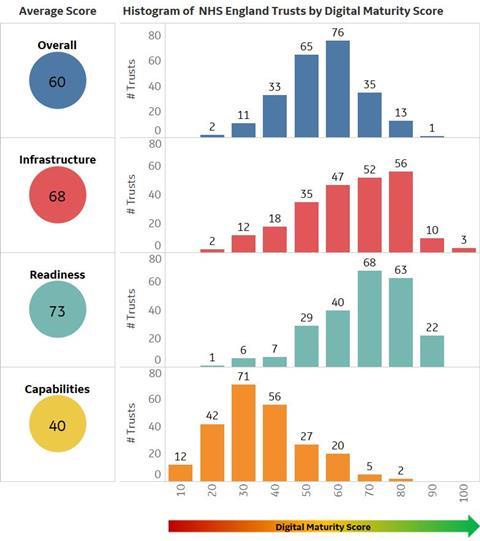
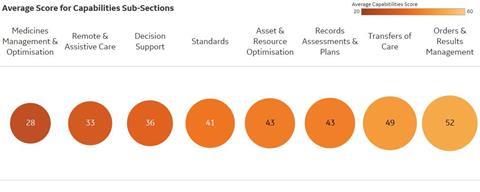
The English NHS is struggling to realise the benefits from digital investment
The results of the Digital Maturity assessment point to two clear trends:
- The majority of the trusts feel they can operate paper-free (readiness) and have the digital infrastructure in place.
- However, trusts report a lack of confidence in their capabilities to exploit this digital infrastructure.
Trusts averaged the lowest scores in three capabilities areas – medicines management and optimisation, remote and assistive care, and decision support – indicating a clear need in designing and embedding processes and capabilities. The low self-assessed scores in digital capabilities, specifically decision support, highlight a clear gap in exploiting the digital potential available in the trusts, which could have an impact on their benefits realisation.
Digital maturity is a challenge for almost all STPs
There is a complex landscape of digital competency by trust across the country. When grouping the trusts by sustainability and transformation plan areas, two STPs have notably low digital maturity overall average, ie below 50.
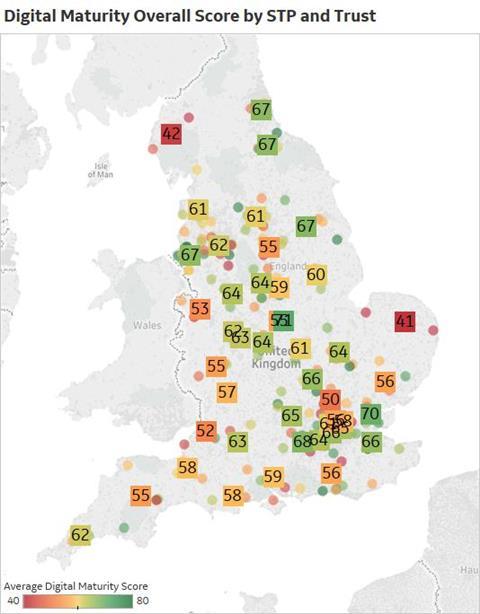
Yet there are very few STPs that have all of their trusts reporting very high overall digital maturity scores. Most of the STPs have a mix of capable and struggling trusts, with only a quarter of the STPs with at least one trust with a high level of digital maturity (ie overall score above 80).
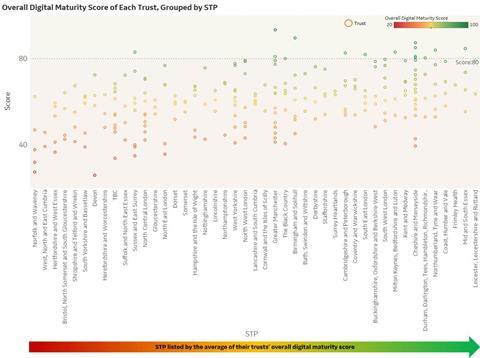

Digital maturity is linked to better outcomes in some areas…
The likelihood of trusts having better care outcomes (ie receive a good or outstanding overall CQC rating) generally increases as a trust gets a better grip on their digital systems. There is a trend where a trust is more likely to have a positive (good or outstanding) CQC rating the higher its digital maturity score.
For trusts with their digital overall maturity score above 80, there is a clear increase in the likelihood of a trust having a positive CQC overall, effective, safe, and well-led ratings.
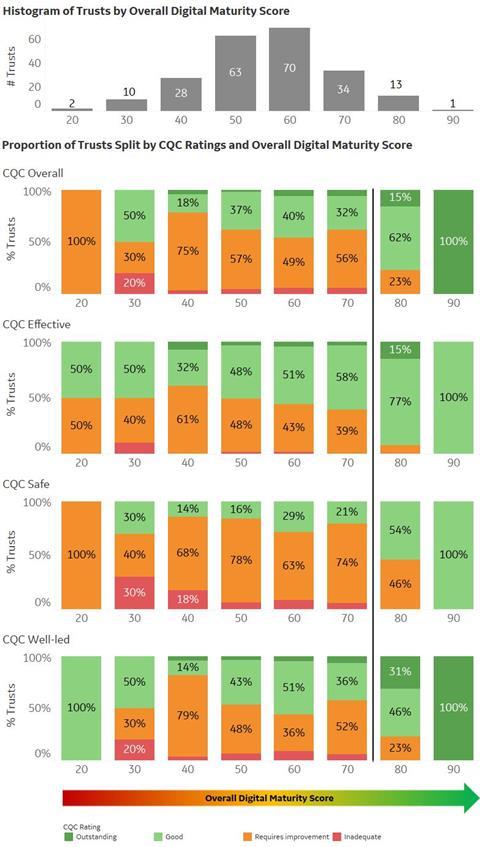
Digital maturity appears to be indicative of a well-performing organisation. Being “well led” appears to influence a trust’s ability to unlock the potential of its digital capabilities. Having the right information at the right time is likely to be a key enabler for leaders in digitally mature trusts to make better decisions. Good leadership is an enabler for a trust to develop and embed the processes required to get the most out of the information available.
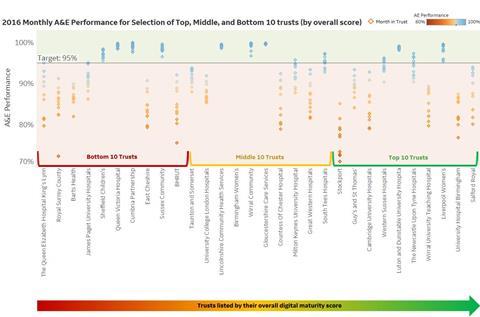
Thoug not for all outcomes: digital competence is not a key driver of A&E performance
There is an absence of a relationship between digital competency and A&E performance. Trusts with higher digitally maturity scores still struggle to achieve the A&E performance target of seeing 95 per cent of patients within four hours.
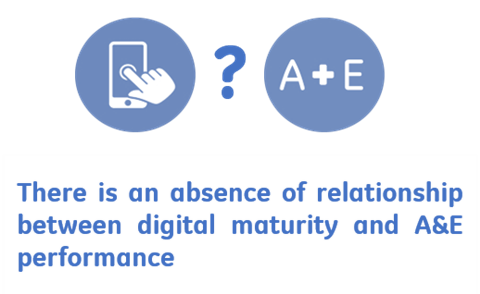
On the other hand, some trusts with the lowest digital maturity scores achieved the A&E performance target every month in 2016.
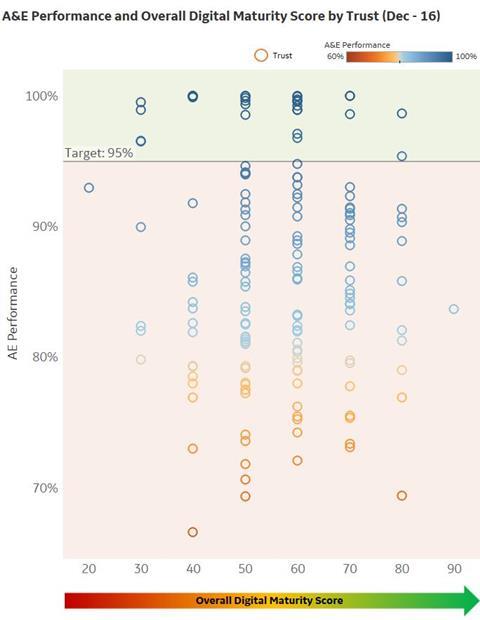
Bigger is better
Size may indeed matter when it comes to digital competency. Trusts of larger size (equated to the number of overnight and day beds in a trust) tend to report higher digital maturity scores and have a smaller spread in their scores.
Smaller trusts may lack the resources to implement their digital capabilities. There is an argument in economies of scale helping to deliver the full potential of digital systems, with larger organisations better equipped to roll out standards and best practices to enable change.
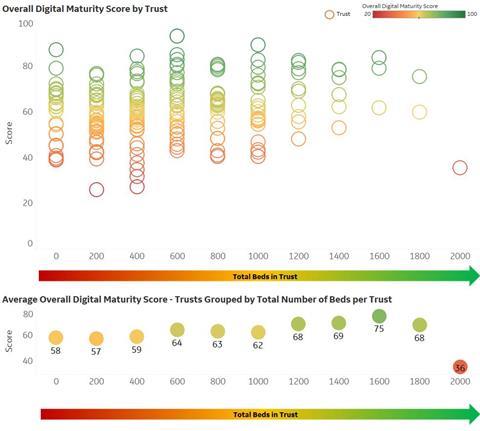

The English NHS needs to develop its digital capabilities
The results for the English NHS Digital Maturity survey indicate that improving digital maturity is an operational change and strategic issue. The NHS should dedicate efforts towards supporting trusts in developing their digital capabilities – especially to support day-to-day operations and decisions – to enable an environment where “professionals and patients make more informed decisions and better choices, improving outcomes and efficiency”.
GE Healthcare Finnamore brings significant experience of integrating digital systems and leveraging data to improve health system operations. It supports clients across health and care systems to develop strategy and implement change to liberate the value of existing investment through the use of world class change and decision support tools.
























No comments yet